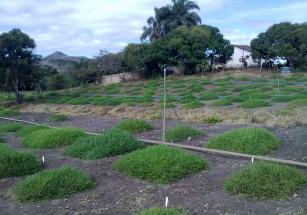Evaluation and selection of clones of Bermuda and Star grass
Evaluation and selection of clones of Bermuda and Star grass

Photo: Benites, Flávio
Most stargrass and bermudagrass species grown in Brazil were developed and evaluated in the United States. The cultivars grown in Brazil were not developed for Brazilian environmental conditions and there are no official records showing the introduction of the species in Brazil, thus this happened possibly due to the curiosity of some cattle farmers. The aim of the project was the development of stargrass and bermudagrass clones adapted to soil and climatic conditions of Minas Gerais State, Brazil. The studies evaluated 700 genotypes of purple stargrass from seed collections and 75 progenies from exchange with ILRI – Ethiopia. The 700 genotypes were evaluated in field trials for selection regarding the characteristics forage green and dry weight, regrowth vigor and traits related to forage quality. In the first year of experiments the 70 best genotypes were selected with the help of the selection index. They were then studied in the second year, in experiment of endurance to two species of spittlebug. The clones that showed resistant to the species of spittlebug were selected to be recombined, making it three breeding populations, which are currently available to be worked on future projects. One of such populations is formed by the recombination of clones which are resistant to both spittlebug species, whereas the other two populations are formed by the clones that show resistance to each spittlebug species separately. In the future, the clones with superior performance will be evaluated in finalistic trials to release a cultivar of Cynodon adapted to the environmental conditions of Minas Gerais State.
Ecosystem: Atlantic Forest
Status: Completed Start date: Wed Jan 01 00:00:00 GMT-03:00 2014 Conclusion date: Thu Dec 31 00:00:00 GMT-03:00 2015
Head Unit: Embrapa Dairy Cattle
Project leader: Flavio Rodrigo Gandolfi Benites
Contact: flavio.benites@embrapa.br
Keywords: melhoramento forrageiro, Cynodon
